This post is part of The Fabulous Films of the 30s blogathon hosted by the Classic Movie Blog Association. Click here to see the many wonderful entries! For an eBook collection of blogathon entries, click eBook on the menu above.
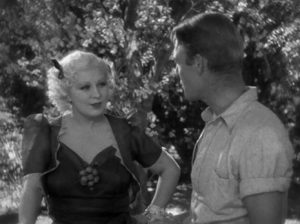
It’s easy to dismiss Go West Young Man (1936) as an inferior Mae West film. It doesn’t contain her best double entendres, and features much less screen time with her than in earlier pictures. The actress didn’t even originate the story; she adapted it from Lawrence Riley’s hit play, Personal Appearance. How could the film measure up to its hilarious predecessors, which West developed to highlight her own sexuality?
It doesn’t, but that’s part of the point—and the fun. The panning of Hollywood in the play must have appealed to West. But I think she saw something else in the story too: by converting the play to film, she could mock the Production Code itself. After all, West’s raunchy scripts and uninhibited performances from the early 30s have been cited as reasons for the Code’s enforcement. She must have laughed to discover the following opportunities to satirize her nemesis:
The Opening
We begin the story at a premiere of actress Mavis Arden’s (West’s) film, Drifting Lady. The camera darts back and forth between the screen and the crowd in the theater viewing it. All of the men in Drifting Lady are pining for Mavis’s character, a nightclub singer with multiple lovers.
Mavis plays the role in a comfortable, bawdy style, and then abruptly regrets her cheating ways and loses her man. An artificial chill settles over Drifting Lady when she does. This would never happen in a pre-Code West film, we viewers remind ourselves. West is supposed to get all of the guys, and celebrate every sexual conquest with a one liner.
Mavis’s acting has been natural (or at least, natural for West) up to this point. But when her lover is about to depart, the star holds out her arm in a stagey gesture and sputters sentimental bilge about April and blue skies and fond memories.
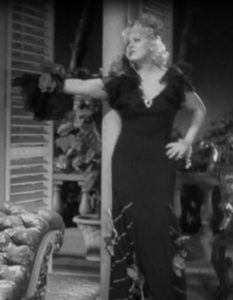
The actress adopts the same stagey line and tone when she talks to the crowd after her film.
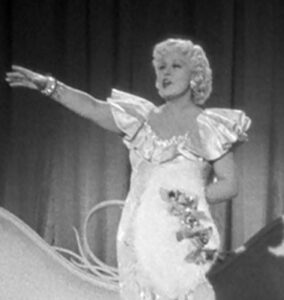
She claims to be an “unaffected girl,” not the siren she plays in film. She then proceeds to share peculiar details about her life. Even if we hadn’t noticed Mavis’s fake tone, her press agent, Morgan (Warren William), rolling his eyes in the background would confirm our suspicions: she’s exactly like the character in the film. The studio might try to make her seem pristine, but we know she’s far from it. Don’t blame me, West’s deliberate hamming reminds us. This censorship nonsense isn’t my call.
Blaming the Studio
After Mavis leaves the stage, Morgan selects a few token men to greet her, all of them homely. When a spectator challenges the lack of handsome men, we learn that Mavis isn’t allowed to marry for five years, with Morgan acting as her watchdog. “Why make the job tough for her?” he adds.
We suddenly understand that strange speech after the film, when Mavis not only felt the need to pronounce her purity, but kept repeating her producer’s and studio’s names, AK of Superfine Pictures, Incorporated. She wasn’t sharing her everyday life with her audience; she was spelling out the terms of her contract. Clearly, this scene ridicules the studios’ tight control over stars’ personal lives. But it does much more: It satirizes limitations on believable behavior onscreen thanks to the Production Code. West, who had attracted censors from the start of her film career, must have relished each “incorporated” she uttered.
Marriage as a Substitute for Sex
West could no longer pen scenes of women seducing men without repercussions. In Go West Yong Man, she resolves this problem by referencing marriage when she means sex. By following the letter, but not the spirit of the Code, West emphasizes the ludicrous nature of censorship.
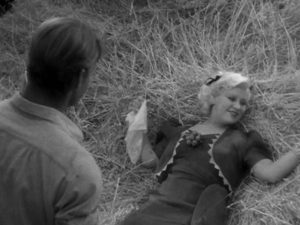
The plot of the film is fairly simple. Morgan foils any romance Mavis attempts. (My favorite brush off: “We handle Ms. Arden’s admirers alphabetically; I’m just now getting into the Bs.”) She’s planning to join a former lover, a politician, after her film premiere. Morgan invites the press to her date, causing the lover to panic and giving Mavis the chance to express her true nature.
“Have you any particular platform?” the press asks her.
“The one I ain’t done,” she quips.
She soon departs, with the two planning to meet again in Harrisburg. En route, her car breaks down, and Mavis is stuck in a rural boardinghouse with her assistant and Morgan until it’s repaired. The delay annoys her until she spots a handsome young mechanic (Randolph Scott). Her suggestive look at his body and enthusiasm about his “sinewy muscles” say it all: We’re not talking about marriage, folks.
The Supporting Players
William is brilliant as Morgan. A New York Times reviewer described him as “the only player who has ever come close to stealing a picture from Mae West.” But he’s not alone. The boardinghouse proprietor is played by Alice Brady, and while the actress’s comedic chops aren’t fully exploited, the talents of those who play her employee Gladys (Isabel Jewell) and Aunt Kate (Elizabeth Patterson) are. The latter is an aging single woman, who makes knowing remarks about Mavis’s sexual attraction (i.e., “It”), her public relations, and her shade of hair, a color that did not appear in daylight in Aunt Kate’s youth.
Gladys, an aspiring actress, attempts to impress Morgan by mimicking Marlene Dietrich. Morgan’s dismayed reactions are hilarious.
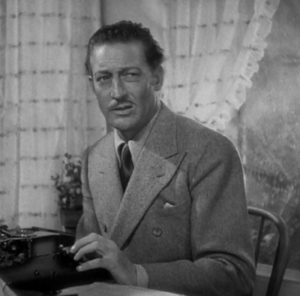
While her Dietrich attempt flops, Gladys’s imitation of Mae West’s walk is something to behold. As the innocent in the film, Gladys illustrates the futility of censoring West’s words when that body does so much of the talking.
Unfortunately, the one black character in the film is a fool, or appears to be at first. Halfway through the movie, I became convinced he had just been smoking a lot of weed. It may be wishful thinking on my part, but could it be another snide jab at the censors, who would be unlikely to examine such a minor role closely?
Scenes with Mr. Oblivious
The funniest moments in the Go West Young Man are when Mavis tries to seduce the handsome mechanic, who completely misreads her blatant moves on him.
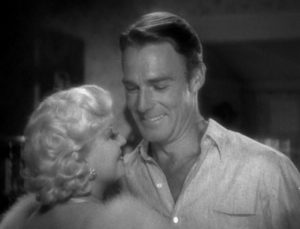
Busy displaying his invention, he misses the meaning of such subtle lines as these:
- “Modesty never gets you anything, I know.”
- “I’d just love to see your model.”
- “I can’t tell you the number of men I’ve helped to realize themselves.”
It’s amusing to see West’s attractions fail, given how many times we’ve seen the opposite. But what’s even funnier is to witness the man’s obtuseness. Clearly, he’s a surrogate for the censors, who must be fooling themselves (or be quite naïve) to misunderstand the meaning of West’s every look, every line.
Go West Young Man undermines the notion that sex can be discouraged by rules. The film may not have been one of West’s triumphs in terms of box office or critical acclaim, but it is a riveting look at a writer’s reactions to early Hollywood’s rule-bound universe.
Of course, the title makes little sense, referring to a famous historical line the film doesn’t address. I like to think of it as a reference to the star herself, with just one preposition (and comma) missing: “Go for West, young stud. You won’t regret it.”

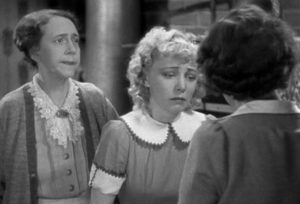
Wow – this is one Mae West I have never seen. It is fun to re-watch old favorites and classics, but it always exciting to discover something new (no matter how old). I loved your post and really do want to see this film. when watching, i will keep your review in mind. Good work.
Thank you! I find her such a joy. One star I really wish I could have met. It’s such a quirky, odd film. I hope you like it:)
This is a wonderful review! I love it! I’ve not seen this film and am keen to see it ASAP now that I’ve read your review.
I love the idea of Mae West mocking the studios et al with her hammy performance. I bet it’s brilliant.
Thank you! It’s a joy to watch her operate. They must have seriously underestimated her. You can’t let that woman loose on a script and think you’ll come out of it unscathed:) Leah
This was the very first Mae West movie I watched. I was a teenager and I realized I was seeing someone who was a total individual. I didn’t realize how much of a mark she made in her earlier films until years later. Looking back, I think it was a good introduction although I couldn’t have told you why until I read your insights. Well done!
Thank you! It would be a great intro to her. I understand why it’s not her most famous, but I think it should get much more credit than it does.
This may be the only Mae West Film I have not seen. Will have to be only the look out for it. Great review!
Thank you. Isn’t it wonderful to have one yet to watch? I’m not done yet either, thankfully:) Leah
I love your version of the title! Thanks for this great review–I really enjoyed reading about this film as an allegory of censorship!
Thank you! It’s such a fun film:)